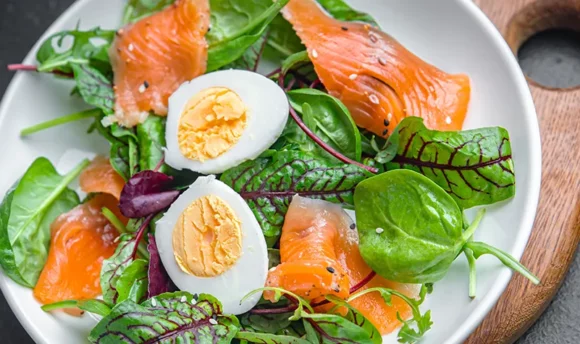Keto vs. LCHF: Which One Is for Me?
LCHF and keto are both popular. Which one is better and more effective? Our nutritionist did a research for you!

Low-carb diets are all the rage, particularly as a weight-loss tool.
Many exist, with carb counts ranging from relatively low to virtually non-existent.
This article discusses two popular low-carb, high-fat diets: keto and LCHF. In theory, they’re very much the same concept, but we’re going to illustrate the key differences and results.
From there, you can conclude which fat loss diet is most fitting for you.
Let’s go!
Is LCHF Diet the Same as Keto?
LCHF and the keto diet are not the same, but they have a similar premise.
The hallmark of both is a low-carb, high-fat diet. Each requires a restriction on carbohydrate intake, swapping carb-rich foods for healthy fats. The chief differences come down to protein intake, carb limits, and the severity of those restrictions.
Overall, you have more freedom with LCHF.
Most people who use these diets are seeking to lose weight. As well as promoting weight loss, LCHF and keto have potential health benefits that include blood sugar and blood pressure management and appetite control.
LCHF Diet
LCHF means low-carbohydrate, high-fat. Ultimately, it’s a variation of the traditional keto diet.
The clue is in the name. Simply put, the LCHF diet means cutting down on carbs and eating more fat.
It’s not as harsh or demanding as following a ketogenic diet. Carb counting is less severe, and it can work as more of a healthy lifestyle choice than a strict diet.
The aim is to reduce overall calorie intake by eating fewer carbs and keeping away from highly processed foods usually packed with simple carbs, providing no nutritional value.
There are no precise food group ratios, but a regular low-carb diet suggests eating up to 100 grams of carbs per day. It’s an easy diet to adjust as you figure out your personal needs.
There are variations of low-carb, too, like the Atkins diet.
Low-Carb Diet Pros and Cons
Before starting with low-carb diets, always check out the potential positives and negatives. Here are the pros and cons of the LCHF diet.
Pros
- Supports weight loss with fewer calories and healthier food choices
- Cuts out high-carb foods from highly processed products
- No restrictions on protein intake (encourages more protein)
- No strict calculations
- Reduces sugar intake
- Carb restriction isn’t excessive
- More sustainable than ketogenic diets
- May benefit medical conditions including diabetes, high blood pressure, and heart disease
- Easier transition stage
Cons
- May cause nutritional deficiencies if you limit food groups
- May trigger constipation
- Potential to cause nutritional deficiencies
Keto Diet
The keto diet is a strict diet that slashes your carb intake and replaces it with lots of fat and moderate protein.
With keto, you are tricking your body into the metabolic state of ketosis. Without sufficient carbs, your body doesn’t have enough glucose to use for fuel and thus, burns stored body fat in its place.
For this reason, the ketogenic diet helps people successfully lose body fat relatively quickly.
The only way to reach nutritional ketosis is to limit your carbs strictly. Compared to the LCHF diet, you can expect to consume less than 50 grams of carbs per day.
It’s more intense than the LCHF diet.
Keto Diet Pros and Cons
Let’s get straight into the benefits and risks of the keto diet.
Pros
- Promotes weight loss and burning fat
- May support appetite suppression and reduce sugar cravings
- May lower blood sugar
- May lower blood pressure and cholesterol
- It can help manage insulin levels
- Potential therapeutic benefits for patients with epilepsy and Alzheimer’s disease
Cons
- Drastic carb reduction
- A more demanding transition phase
- Many participants experience keto flu (flu-like symptoms)
- Too much protein can prevent ketosis, so protein intake is limited
- May trigger constipation
- Potential to cause nutritional deficiencies
LCHF vs. Keto: Which One Is Better?
We can’t say for sure which low-carb diet is better, as it comes down to preference.
Both low-carb and keto necessitate a new eating plan, restricting carbs and consuming a lot of fatty foods. It’s not everyone’s cup of tea, but low-carb diets are proven to induce weight loss and other health benefits.
It’s essential to look at your situation before trying a low-carb diet, as factors such as age, current body weight, and health status can impact results. We always recommend discussing diet habits with your doctor.
Keto diets are harder to sustain, as many people can’t handle low-carb diets. With limited protein, too, it can be tough to keep up energy levels during the transition phase to ketosis.
There’s also more pressure, as too much protein can halt ketosis, so you have to be scrupulous about what you eat daily. That said, many people do manage to live a healthy keto lifestyle.
LCHF allows you the freedom to adjust your carb intake and encourages you to eat protein. It’s a lot more lenient, which makes it easier to sustain.
A Word From Dietitian
All in all, keto diets and low-carb diets are very similar in principle but have significant dissimilarities that impact how you handle and sustain them.
It’s certainly possible to lose weight with either diet, but how long you can keep them up is another matter.
The keto diet is highly-restrictive, featuring very low-carb, adequate-protein, and high-fat foods. LCHF features fewer carbohydrates, plenty of protein, and increasing fat intake.
In short, you can eat more carbs and more protein on LCHF. You can adjust the diet plan as you see fit. With the keto diet, it’s essential to stick to the rules to facilitate ketosis.
A typical low-carb and keto diet consists of leafy greens, fatty fish, grass-fed beef, full-fat dairy products, and non-starchy veggies.
Add high-intensity exercise and plenty of water to your regime for the best weight loss results.
Conclusion
To settle the debate of LCHF vs. keto, you need to weigh out each low-carb diet’s positives and negatives to find the most appropriate one for your lifestyle.
Regardless of your decision, it’s essential to eat enough calories, get your fat sources from healthy fats, and focus on nutritious and colorful foods. Opt for the one that you can merge into a healthy routine.

















































 Select your language:
Select your language: 








